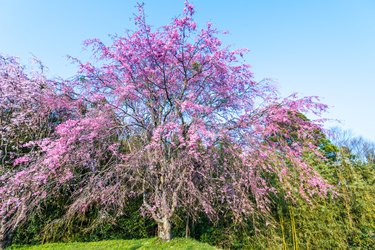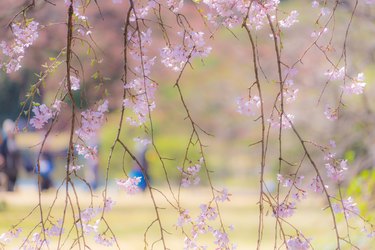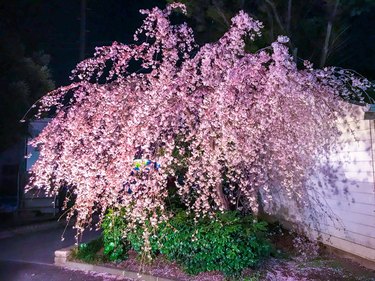
If you're looking for an ornamental to anchor your landscaping, it's hard to go wrong with a weeping cherry tree (aka weeping Higan cherry or Prunus subhirtella 'Pendula' if you're scientifically minded). Its clouds of blossoms in early spring are what make it a firm favorite, but its graceful, weeping shape and glossy foliage give it four-season appeal. The only real downside to these beautiful trees is that they're quite toxic. You won't be at risk of turning up your toes just because you've put one in your backyard, but they can be dangerous to pets and livestock.
Weeping Cherry Tree Origins
Video of the Day

Weeping cherry trees aren't native to North America, though they're related to both our native wild cherry species and the commercial varieties grown for fruit. They're all part of the larger Rosaceae family—like apples and roses—and more specifically, the Prunus genus, which is made up of stone fruit, like plums, apricots and peaches. Like many other flowering cherry trees, they were bred in Japan, where their pink blooms (which grow in clusters of large double flowers) are a much-loved spring highlight—so much so that you may think of it as a "cherry blossom tree" as opposed to a cherry tree.
Video of the Day
You can find Higan cherries with a conventional growth habit, but those with weeping branches have a more graceful look and provide visual interest, even to a winter landscape. Speaking of winter landscapes, part of the reason for these trees' popularity is that they're relatively winter-hardy, and you can grow them in USDA plant hardiness zones 5a through 8b, which covers most of the United States.
Should I Plant a Weeping Cherry Tree?
Despite their beauty, a weeping cherry tree isn’t the right choice for every yard or situation, and the toxicity of its foliage and pink flowers is only one consideration. A few others:
- Weeping cherry trees can grow to over 30 feet in height and have a canopy that reaches 25 feet in diameter, which means you’ll need a really big yard to do one justice.
- As a deciduous tree, the weeping cherry will shed leaves after a brief show of fall color (leaves turn yellow, if you’re curious), and those leaves, as we'll detail, are especially toxic just as they begin to wilt—so you’ll need to dispose of them safely.
- The weeping cherry tree produces fruits, which increase the mess factor. Cherries will attract insects and birds, the latter of which will likely leave droppings in the immediate vicinity.
- Weeping cherries do best in full sun. They’ll grow in well-draining soil but don’t tolerate much drought, so it helps if your own soil skews a bit toward clay. Otherwise, you’ll need to irrigate regularly during dry spells, which can prove costly.
- Weeping cherry trees are prone to a lot of ills, most notably aphids, Japanese beetles, powdery mildew and fungal diseases.
That being said, they also have a lot of upsides. Aside from their beauty, which is really spectacular during bloom time, they provide shade, their pink blossoms attract pollinators and they bring an unmatched presence to any yard that’s large enough to accommodate them.
For homeowners who love the look of a weeping cherry but live on a standard-size lot, there are several popular cultivars of dwarf weeping cherries. Choices such as Snow Fountains (which feature white flowers instead of the typical pink) and Kiku-Shidare-Zakura (sometimes shortened to just Sakura) have a mature height and spread of no more than 15 feet. Each can be trained through pruning to grow to no more than 10 feet in height. Another dwarf cultivar, Hiromi, can be as little as 6 feet tall and can fit into even smaller yards.
Assuming you have space and the soil type for a weeping cherry, the usual practice is to put down landscape fabric around the tree to about its drip line (the edge of its canopy) to discourage turfgrass, which competes with the tree for nutrients. Cover landscape fabric with a suitable mulch, usually a dark bark mulch, to provide visual contrast between blossoms and glossy foliage.
Weeping Cherry Tree Safety

If you do opt for an ornamental cherry tree, you should be aware that all cherries, even the ones in commercial orchards, produce high levels of cyanide-containing compounds (cyanogenic glycosides, to be precise) in their twigs and foliage. If you live in an area where deer threaten ornamentals, that's a positive because deer know to leave them alone. It's your domestic animals that are more of a concern.
Cyanide is widely known as a dangerous poison, so it's unsurprising that weeping cherry trees are highly toxic for much-loved companions, such as dogs, cats and horses, or livestock animals, like goats, sheep and cattle. According to the American Society for the Prevention of Cruelty to Animals, consuming the stems, leaves, seeds and flowers of weeping cherry trees can all cause poisoning to animals, with the leaves being at their most dangerous when they're beginning to wilt. The small fruits aren't considered toxic.
Most severe cases of plant poisoning occur in grazing animals, such as cattle and horses, who eat plant material in bulk. Dogs and cats are likely to only nibble the green leaves in small quantities, though this is still dangerous to them because of domestic animals' relatively low body weight. (And don't choose a cherry branch as a stick to throw for your pup!)
Minimizing Risk to Animals

So, how can you indulge your love for ornamental cherry trees and your love for animals in the same yard? Start by recognizing that a weeping cherry is high maintenance like a weeping willow, and it requires ongoing "hygiene." Cherry tree care includes things like frequent removal of dead branches and fallen leaves, which pose a threat. You can also prune sweeping branches to a height that puts them out of reach for cats or very small dogs, making them less of a temptation.
If you keep grazing animals, your best bet is to either fence your animals away from the tree (you probably don't want them grazing in your yard anyway) or to fence the tree away from animals. This isn't especially difficult with most ruminants, but a goat or an indulged and willful horse will often look at your fence and think, "Challenge accepted!" If you have one of those, exercise extra vigilance to keep them safe.
Warning
Cherry leaves and the trees’ other debris pose a similar risk to infants and toddlers, who like to put things into their mouth. The same safety measures we've recommended to protect animals will also help keep your little ones safe.
The bottom line: With appropriate planning and caution, the weeping cherry tree can be safely enjoyed by household members and visitors alike, but you'll need to take extra caution to keep domestic pets and grazing animals at a distance.